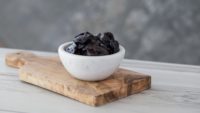The California Prune Board recently released two new studies.
With the holiday season in full swing, consumers are met with countless opportunities to indulge in decadent, calorie-dense foods, which can make their health goals and choices more challenging to manage. New research from the University of Liverpool, England reports that consuming prunes can help control appetite and reduce overall caloric consumption, serving as a perfect snack to keep holiday cravings at bay.
“These studies demonstrate that dried fruit can both produce satiety and be incorporated into diet during weight management,” said Professor Jason C G Halford, University of Leeds and President of the European Association for the Study of Obesity (EASO), who was part of the research team.
The study was conducted in two phases. In the first phase, researchers compared satiety, appetite, and caloric intake among participants who consumed a snack of either prunes, raisins, or jelly-bean-like candy, all comparable in calories. Researchers found that those who ate prunes consumed the fewest calories overall at subsequent meals. The prune snackers also reported reduced hunger levels, improved satiety, and a greater perceived ability to eat less food at subsequent meals.
Click here to read the holiday cravings study.
In addition, new research from San Diego State University’s School of Exercise and Nutritional Sciences reports that eating prunes daily has a protective effect on bone health in men over 50. This study is the first of its kind to examine the beneficial prune effect on bones in men. It is estimated that 2 million men are battling osteoporosis and another 16.1 million men have low bone mass, or osteopenia (Wright et al., 2014).
Despite these statistics, bone disease in men is often overlooked.
“We’ve already seen significant evidence that prunes have a positive effect on bone health in women, so it’s particularly exciting to find that prunes can also play a beneficial role in men’s bone health. We look forward to continuing to study the ‘prune effect’ on bone and other health outcomes in men,” said lead researcher Professor Shirin Hooshmand, PhD, RD, School of Exercise and Nutritional Sciences, San Diego State University.
In this randomized-controlled clinical study, 57 healthy men aged 50-79 years old were assigned to either consume 100 grams of prunes every day or no prunes for twelve months. At the conclusion of one year, the prune consumers showed significant decreases in biomarkers of bone breakdown, while no changes were observed in the control group (Hooshmand et al., 2021). The study authors also reported the men who ate prunes showed improvements in bone geometry indicating greater bone strength.
Historically, research has focused on osteoporosis and bone health in women, already indicating a favorable bone response to prunes specifically among postmenopausal women. Several studies have suggested that eating 50 to 100 grams of prunes everyday could lead to increased bone mass and decreased bone breakdown (Arjmandi et al., 2001; Hooshmand et al., 2011, 2014, 2016). Moreover, a recent case study published in the Bone Reports earlier this year reported that total bone mineral density increased in a postmenopausal woman with osteopenia after she consumed 50 grams of prunes daily for 16 months (Strock et al., 2021).
Click here to read the men's bone health study.




